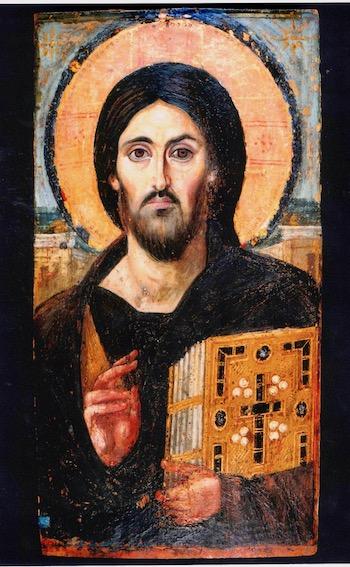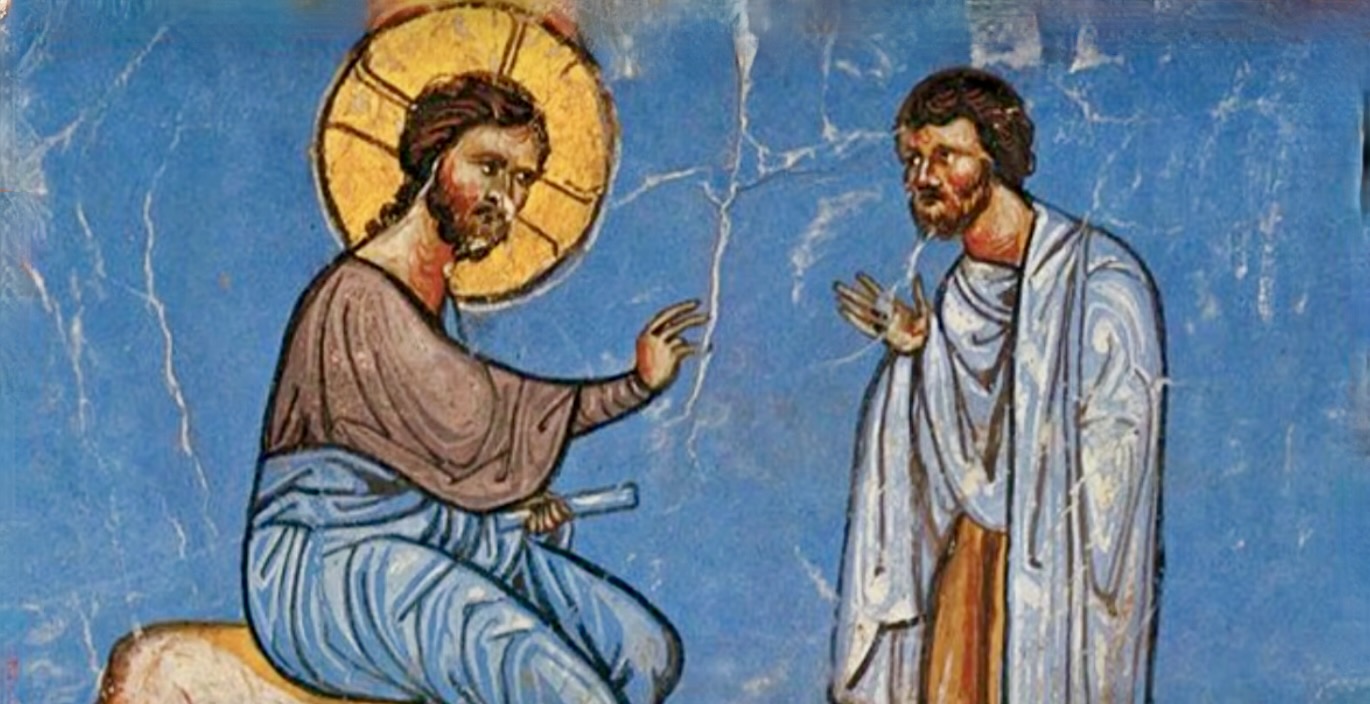
The essence of this oracle, again, is the inverse equation: the ones who lie in beds of ivory while the affliction of Joseph goes ignored.

Have you heard the "Song of Mary," which we call the Magnificat?
|
He has scattered the proud in the imagination of their hearts.
He has put down the mighty from their thrones, And exalted the lowly. He has filled the hungry with good things, And the rich He has sent away empty. (Lu 1:52-53) |
"He has scattered the proud. He has put down the mighty. And the rich He has sent away empty."
Here on the Forefeast, let us also read from the Matins Gospel appointed for the Great Feast of the Dormition of the Most Holy Theotokos. For in it the Lord God literally sends the rich away empty. The rich, young ruler (as commentators call him) now must face a world that is void, forever divorced from the Company of God ..... as he continues to clutch the more stubbornly to his "great possessions" (Mt 19:22).
Rich men and the Kingdom of God. Gospel teachings on this subject do not vary. Of the rich man burning in Hell who gazes upon Lazarus in Paradise, Father Abraham says,
|
"'Son, remember that in your lifetime you received your good things,
and likewise Lazarus evil things; but now he is comforted and you are tormented.'" (Lu 16:25) |
Jesus articulates this same principle from the Mount of the Beatitudes, signifying an immutable Heavenly law:
|
"But woe to you who are rich,
For you have received your consolation. Woe to you who are full, For you shall hunger. Woe to you who laugh now, For you shall mourn and weep." (Lu 6:24-15) |
Always we hear this same inverse equation: the proud and the lowly, the rich and the hungry, the full and the empty, those who laugh and those who mourn. And we recall an oracle of God pronounced by the prophet Amos echoing this same inverse equation:
|
Woe to you who put far off the day of doom,
Who cause the seat of violence to come near; Who lie on beds of ivory, Stretch out on your couches, Eat lambs from the flock And calves from the midst of the stall; Who sing idly to the sound of stringed instruments, And invent for yourselves musical instruments like David; Who drink wine from bowls, And anoint yourselves with the best ointments, But are not grieved for the affliction of Joseph. (Amos 6:3-6) |

The essence of this oracle, again, is the inverse equation:
the ones who lie in beds of ivory
while
the affliction of Joseph goes ignored.
Hearing these unrelenting teachings concerning the rich and the poor, the Disciples are not surprised to hear that the rich cannot enter the Kingdom of God. And they cry out, "Who then can be saved?"
We would be foolhardy to ignore these teachings. The Disciples seem to believe that few of us can be saved signifying that more of us are wealthy than we realize. And few Gospel principles are set down so deliberately and repeatedly. Like the "certain king" of last week's reflection, our God will "settle accounts," for such accounting and judgment are His changeless Nature.
The real subject, of course, is ourselves. With each word and action, we have drawn lines on the earth during our lifetimes which will inescapably convergence on the day of our deaths. The Book of Accounts, which Jesus holds in His left hand, will be opened. And the blessing He holds in His right hand is mysteriously bound together with these accounts.
The Lord tells us that a certain rich man was vexed for he had run out of room to store his enormous hoard: So the man thought,
|
"I will pull down my barns and build greater, and there I will store
all my crops and my goods. And I will say to my soul, 'Soul, you have many goods laid up for many years; take your ease; eat, drink, and be merry.' But God said to him, 'Thou Fool! This night thy soul shall be required of thee; then whose will those things be which thou hast provided?' "So is he who lays up treasure for himself, and is not rich toward God." (Lu 12:19-21) |
The inverse equation is drawn again: a rich man on one side and the blueprints for his enormous barns on the other. Each kernel he hoards is a kernel withheld from the hungry and suffering. It is a zero-sum game. It has been since the dawn of time and always will be: the fullness-unto-bursting controlled by the rich is inversely proportional to the emptiness-unto-starvation suffered by the hungry.
The affliction of Joseph is an icon of this equation. His brothers subtracted him in order to add to themselves. Yet by twists and turns Joseph, would become the Overseer of Pharaoh's granaries, the master of a great civilization's wealth. Joseph stands out in virtue, for he does not choose for himself. He refuses to take from Pharaoh, whether it be the sexual favors of Pharaoh's wife or the wealth of his kingdom. Instead, Joseph chooses the vocation of steward requiting the trust that has been placed in him.
As Jesus surveys human history, the figure of Joseph is a towering one. For it is this figure alone who unlocks the riddle posed by the Lord to His Disciples concerning the camel and the eye of a needle:
|
But Jesus looked at them and said to them, "With men this is impossible,
but with God all things are possible." (Mt 19:26) |
Moreover, the good steward is a favorite subject of Jesus' parables. For example, a king entrusts talents of gold (that is, vast fortunes) to his servants (Mt 25:14-30). The point of the tale is good stewardship. The master entrusts his entire household to the servant who watches through the night (Lu 12:35-48). The point again is good stewardship.
But the outstanding example of this principle is found not in parables, but rather in the Patriarchs, who (as we have said many times) signify the Kingdom-of-Heaven religion, announced by the Incarnation of God. The Lord God richly blesses his faithful stewards Abraham, Isaac, and Jacob, for they are the faithful ones. They do not lead luxurious lives. Indeed, the point of Abraham's call is to depart from the riches of fabulous Babylon (Ur of the Chaldees). He and his wife go from desert to desert seeking always the voice and counsel of God. Jacob lay in the wilderness with a stone for his pillow and wrestled through the night signifying his spiritual earnestness. They are the Fathers of the Faith. Their material blessing is always already a land of milk and honey, for it is not given for them to luxuriate in, but rather to oversee, to manage, to labor in, and to secure for the people of God. In this, material blessing is indistinguishable from spiritual blessing. It is an equation which benefits all.
But the one who feasts on the seed corn, who dines ostentatiously in a gated courtyard while beggars look on, the one who hoards grain while the rest starve, the one who refuses God in order to clutch his many possessions .... What does the Lord say concerning this utter failure of stewardship? "They have had their reward."
We are left with a crucial question, for our own eternal lives hang in the balance. What exactly is our stewardship? Which is the wealth that must we protect and manage? Is there an amount we must write down somewhere lest we lose it? Is there a "net worth" calculation that we must memorize? Wealth is defined as every penny beyond what is required to supply our needs. Should we live simply — guarding a place where we might worship God and pray, providing a roof over our heads, supplying our pantry with adequate food and drink, ensuring that we have decent clothing to wear — then all besides these things constitutes our wealth. What exactly is our relationship to this wealth? It must never be called ownership, as the Acts of the Apostles make clear (Acts 2:43-47). But must always be our stewardship. For all that we have, always and everywhere, proceeds from God:
|
For every beast of the forest is Mine,
And the cattle on a thousand hills. I know all the birds of the mountains, And the wild beasts of the field are Mine. (Ps 50:10-11) |
As St. Paul has written,
| All things come from God, through God, and return to God. (Rom 11:36) |
In particular, we at the Hermitage are ever mindful that God has worked miracle after miracle here making it possible for us to live on this farm and to have standing as a monastery in the One Holy Catholic and Apostolic Church. For neither was remotely in the offing for us. And nothing we have done has secured these blessings. Yet both fell down like heavy rain as we stood directly under Heaven. The other miracles we have seen, too numerous to describe, we protect in holy reverence and silence.
But the one who styles himself the owner of riches, the man who calls himself the decider .... this one is deluded by a thin outer show of false security, and it will be this one who blindly stumbles forward into disaster, "And found no end in wandering mazes lost" (Paradise Lost, Book II).
And what of the good steward? What shall we say of the good men and women around us who prudently oversee the wealth with which God has entrusted them? We take satisfaction in silence as we hear the Lord Himself bestow those longed-for words upon our brothers and sisters:
| "Well done, good and faithful servant." (Mt 25:23) |
Illusions crowd in beyond numbering. If we go through life with our eyes fastened upon a back-lit screen, then that number is greatly multiplied. The only abiding real is our God.
I tell people casually, Do not follow the example of the ones around you, for the constant state of the human person is to be deluded. If most people believe something, this is a de facto demonstration that it is not true. And chief among these many delusions is that most people do not believe in God. Even among those who say they believe, the daily conduct of their lives and the choices they make plainly give the lie to this claim. Yes, unbelief is the most dangerous of all delusions. Yet, His eye is on the sparrow. And He is a loving Father Whose heart dotes upon the least among us (Mt 25:40-45).
We could do worse than to remember words written on the occasion of the Nativity of our Lord and God, words written not so long ago:
|
O Woman, you may keep the gold;
the Child we seek doesn't need our gold. On love, on love alone He will build His Kingdom. His pierced hand will hold no scepter; His haloed head will wear no crown. His might will not be built on your toil. Swifter than lightning He will soon walk among us; He will bring us new life, and receive our death. And the keys to His city belong to the poor. (Gian Carlo Menotti, Amahl and the Night Visitors) In the Name of the Father and of the Son and of the Holy Ghost. Amen. |